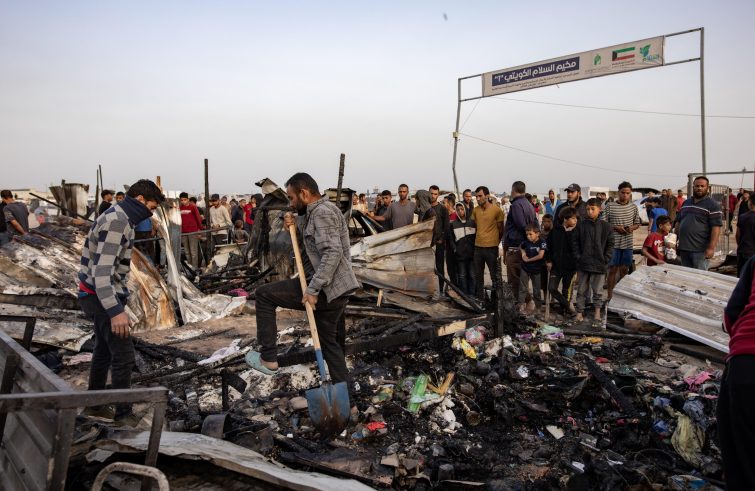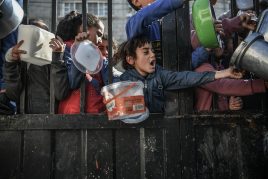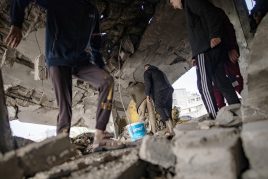
At least 45 people were killed and more than 180 wounded in Israel’s raid on two senior Hamas leaders, Yassin Rabia and Khaled Nagar, in the Tal al Sultan area of Rafah in southern Gaza – Israel deems the two responsible for carrying out multiple attacks against Israel and operations in the West Bank. The attack was “based on precise intelligence”, an IDF statement reads. “As a result of the strike and subsequent fire, a number of uninvolved individuals were hit. The incident is under investigation”. The international community, which has called for an end to the military intervention, has condemned the raid. Prime Minister Benjamin Netanyahu said he “regretted” the “tragic accident” that led to a massacre of civilians. An independent commission is handling the investigation, launched by the military prosecutor. Hamas said it would reject the resumption of Qatari, Egyptian and US-sponsored talks scheduled for today (Tuesday) to discuss a new ceasefire and the release of some 120 Israeli hostages, calling the attack yet another “Zionist massacre.”
 “This massacre in Rafah pushes the hoped-for ceasefire agreement into further distance,” Michele Brignone, head of research at the Oasis Foundation, told SIR. “It can somewhat be said that this bloodbath ‘favours’ – so as to say – the incumbent Israeli government, and in particular the Prime Minister, who has long declared that the ultimate goal of this war is total victory.” This position was reiterated yesterday in a speech to the Knesset, as reported by the Times of Israel: “I will keep fighting until the flag of victory is raised. I don’t intend to end the war before every goal has been achieved. If we give in, the massacre will return. If we give in, we will give a huge win to terror, to Iran.” “Total victory,” explains Brignone, a professor in the Middle Eastern Studies Master’s programme at the Alta Scuola in Economia e Relazioni internazionali (ASERI, Cattolica University of Milan), “means the eradication of Hamas from Gaza, a goal that has been known since the beginning of the war. Now, after months of war, after bloodbath after bloodbath, Hamas is certainly weaker, but it is far from eradicated, not only because it is still present in southern Gaza – which is the reason for this latest military operation – but also because it is re-emerging in other areas, as has been widely reported, including by US officials.
“This massacre in Rafah pushes the hoped-for ceasefire agreement into further distance,” Michele Brignone, head of research at the Oasis Foundation, told SIR. “It can somewhat be said that this bloodbath ‘favours’ – so as to say – the incumbent Israeli government, and in particular the Prime Minister, who has long declared that the ultimate goal of this war is total victory.” This position was reiterated yesterday in a speech to the Knesset, as reported by the Times of Israel: “I will keep fighting until the flag of victory is raised. I don’t intend to end the war before every goal has been achieved. If we give in, the massacre will return. If we give in, we will give a huge win to terror, to Iran.” “Total victory,” explains Brignone, a professor in the Middle Eastern Studies Master’s programme at the Alta Scuola in Economia e Relazioni internazionali (ASERI, Cattolica University of Milan), “means the eradication of Hamas from Gaza, a goal that has been known since the beginning of the war. Now, after months of war, after bloodbath after bloodbath, Hamas is certainly weaker, but it is far from eradicated, not only because it is still present in southern Gaza – which is the reason for this latest military operation – but also because it is re-emerging in other areas, as has been widely reported, including by US officials.
“Netanyahu has to survive politically,” Brignone points out. “This survival is linked, on the one hand, to the continuation of the war and, on the other, to a ‘chimeric’ total victory.
“Unfortunately,” he adds, ” to some extent this bloodshed is also benefiting Hamas, which has recently been able to recruit new fighters thanks to the massacres committed by the IDF.”
I assume that both parties are losing: Israel is losing because of its inability to conclude its military operation, which has no clear objectives beyond the vision of final victory. Israel is not winning because it is falling far short of the goals set by its government, and today it finds itself in a quagmire. There can be no retreat, because that would be tantamount to an admission of defeat. Only with these flagrant and devastating attacks can the IDF advance. Hamas is not winning either, because its military capacity has been severely damaged. However, Hamas’ mere survival can be seen as a non-defeat or a near victory.
How can this quagmire be remedied? Is there still a role for the international community, for mediators such as Egypt, Qatar and the United States?
There is a lot that regional actors can do and have tried to do to some extent, especially in terms of mediation. We know that there have been several rounds of talks, particularly to broker a ceasefire. They have all failed, with the exception of the first agreement at the end of last year. There is only one actor that can change things, and that is the United States. It should also be noted that the Biden administration has so far been extremely oblique in its approach. When the Gaza operation began, the White House spokesman made it clear that there were no red lines. At one point, however, it seemed that the Rafah operation was the red line. A red line that had already been violated on a massive scale. A few weeks ago, US President Joe Biden blocked a shipment of heavy weapons to Israel. He subsequently clashed with Netanyahu, but without any major consequences. The latter declared that Israel was ready to proceed unaided.
A new war is being played out in the field of propaganda and communication. Once again, who is winning?
In terms of communication and propaganda, Israel is losing because of miscommunication and retractions, dubious versions of events and, above all, because of the scale of the military operation and the disproportion between the attack and the response. Hamas, for its part, wins because it successfully manages to portray itself as a resistance movement, as its name suggests – Hamas stands for Islamic Resistance Movement. Hamas has been building its own legitimacy among Palestinian civilians as a national resistance movement against the occupation for the past 10-15 years. The ongoing war has injected new momentum into the Palestinian cause, which had been neglected and marginalised. Now Hamas can take credit for relaunching it on international agendas.
Speaking of the Palestinian cause, do you think it is fair to label as anti-Semitic all those who, in the context of this war, support the Palestinian cause without supporting Hamas?
No, it is not fair. This accusation has become a kind of bludgeon wielded to delegitimise any form of criticism. Let us not forget that there are also many Jews who sympathise with the Palestinians, but not with Hamas, and who are accused of anti-Semitism. An article by former prime minister Ehud Olmert – the last prime minister to hold talks with the Palestinians under the process initiated by the Oslo Accords – was published in the Israeli daily Haaretz on Friday. In his article, Olmert, who is neither anti-Semitic nor anti-Zionist, makes it very clear that the current government has blood on its hands and is doing great harm to the State of Israel.
In my view, the accusation of anti-Semitism, which is systematically hurled at supporters of the Palestinian cause, has become untenable.
I am certainly not denying that there is a glaring resurgence of anti-Semitism around the world, and not just against Jews living in Israel.
How has the Oasis Foundation, devoted to the study of Middle Eastern affairs since 2004, the year of its inception, and which offers a platform for respected voices and ideas that promote dialogue and peace, been following this conflict?
We have been following and reporting on the conflict from different perspectives. Every Friday, we publish the newsletter ‘Focus current affairs’, which covers the latest news through editorials published in the international press. We then produce in-depth reports on some specific aspects of the conflict, offering insights from influential and respected figures such as the Latin Patriarch of Jerusalem Card. Pierbattista Pizzaballa. He is a very keen observer and a prophetic voice who knows how to indicate a possible path – a long and painful path – out of this decades-long conflict.













